Welcome to UVM Blogs. This is your first post. Edit or delete it, then start blogging!

Archives
Categories
- comments (3)
- requirements (1)
- resources (6)
- rubrics (2)
- schedule (1)
- Uncategorized (2)
Site Meta
Seminar in Educational Psychology – Sum06
The Very Cool Poster Projects
Posted: July 7th, 2006 by Charles Rathbone
Comments for Friday’s class. (6/30/06)
Posted: June 30th, 2006 by Charles Rathbone
I thought today was a really useful class. I hope my perception was correct. The activity came to me while I was reading Meier last night. “Teachers need frequent and easy give and take with professionals from allied fields – that is one mark of a true professional. They need opportunities to speak and write publicly about their work, attend conferences, read professional journals, and discuss something besides what they’re going to do about Johnny on Monday. Their must be some kind of combinatino of discomfiture and support – focused always on what does and does not have an impact on children’s learning.” I thought you were ready to go to a deeper level of exposure about what each of you do, how you do it, and how it might be done differently…and even to advise each other in the process. I know the activity was a little tentative at first but then each group just seemed to take off as you shifted from worrying about whether you were doing the right thing to doing what you were deciding to do. Great energy and very productive performances. And I even got a chance to say once again that the cognitive style stuff cuts across the MI categories. I think sometimes it can be a better form of differentiation. I love the idea of having those Structurtopia cards 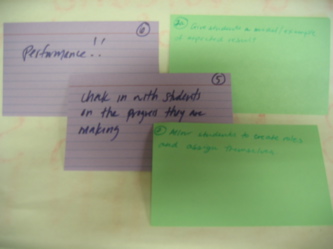 hanging on a wall and kids occasionally being able to choose their task for the day based on the cards. Enough. Ch.
hanging on a wall and kids occasionally being able to choose their task for the day based on the cards. Enough. Ch.
Photos from ATI work.
Posted: June 30th, 2006 by Charles Rathbone
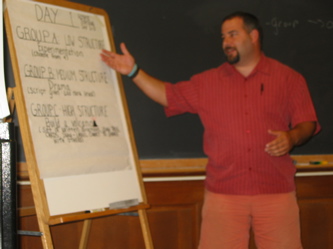 G1: showing how the rotation will work.
G1: showing how the rotation will work.
 G2: Jan Marie’s travels.
G2: Jan Marie’s travels.
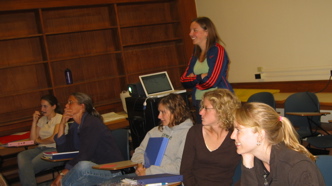 G2: Where’s Denali?
G2: Where’s Denali?
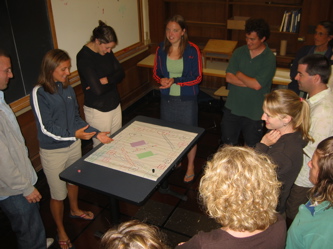 G3: Strukturtopia.
G3: Strukturtopia.
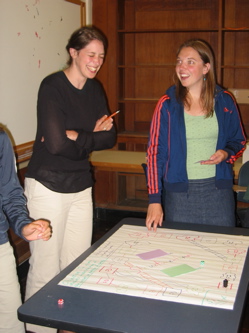 I never knew ATIs could be this much fun!
I never knew ATIs could be this much fun!
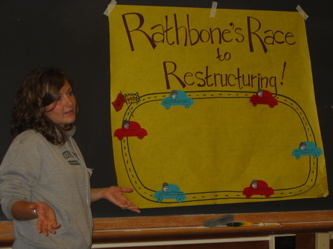 G4: This is how we responded to Kristen.
G4: This is how we responded to Kristen.
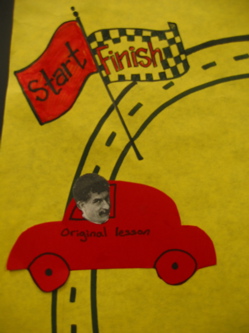 You bet your life! And the magic duck comes down… .
You bet your life! And the magic duck comes down… .
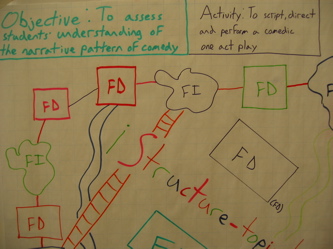 Strukturtopia up close and personal.
Strukturtopia up close and personal.
 Instructions Strukturtopia style – FD and FI.
Instructions Strukturtopia style – FD and FI.
Articles by David Berliner
Posted: June 29th, 2006 by Charles Rathbone
This is the page from Berliner’s own website that provides links to articles he has personally authored of his choosing. The articles he’s chosen span his career and begin with an (incomplete) summary her wrote of the California Beginning Teacher Evaluation Study.
Topics from Berliner’s Two Articles
Posted: June 29th, 2006 by Charles Rathbone
Berliner’s Topics
The general failure to take the abstract and partial understandings of educational psychology and make them re-comprehensible to practical people is an unfortunate, unpleasant, and, I believe, a continuing part of our history .
Bruner …identified storytelling as one of two fundamentally different modes of human thought, standing in contrast to the analytic, linear way of thinking prevalent in logic, mathematics, and the sciences. …One has formal means to verify truth, the other establishes only verisimilitude; one seeks explications that are context fee and universal, and the other seeks explications that are context sensitive and particular.
Stories are powerful research tools. They provide us with a picture of real people in real situations, struggling with real problems. They banish the indifference often generated by samples, treatments, and faceless subjects. They invite us to speculate on what might have been changed and with what effect. And, of course, they remind us of our persistent fallibility
1. time on task – Barak Rosenshine, Charles Fischer, David Berliner
2. multiple intelligences – Howard Gardner
3. zone of proximal development – Lev Vygotsky
4. accommodation and assimilation – Jean Piaget
5. authentic assessment
6. Lewin’s interactive theory – Kurt Lewin
7. expectancy x value motivational theory – Jacquelynne Eccles and Allan Wigfield
8. Carroll’s model of learning: the opportunity to learn – John Carroll
9. mastery learning – Madelyn Hunter, Benjamin Bloom
10. aptitude treatment interactions – Richard Snow
11. testing effects
12. retention
13. expectations states theory – Rosenthal, Berger
14. Weikart’s High-Scope Program early childhood education effects – David Weikart
15. effective instruction – Ron Edmonds
16. class size – Gene Glass
17. cooperative learning – David and Roger Johnson, Robert Slavin, Elizabeth Cohen, Rachel Lotan, Spencer Kagan
18. direct instruction – Barak Rosenshine
19. cross-age tutoring –
20. reciprocal teaching – Ann Marie Palascar
_________________________
21. universal design principles
22. Clark’s research on African-American self-esteem – Mamie Clark, Kenneth Clark
23. Circles of Courage – Larry Brendtro
24. differentiated instruction – Carol Tomlinson, Linda Heacox
25. self-efficacy and social skills teaching – Albert Bandura
26. democratic models of classroom discipline – Rudolf Dreikurs, Jane Nelsen
27. control theory – Wm. Glasser
28. teaching wide ranges of ability
multiage teaching
project based learning
differentiated instruction
“active learning”
expeditionary learning
place based education
ASCEND School
Posted: June 25th, 2006 by Charles Rathbone
The Ascend School is one of several small schools that make up the East Oakland (CA) small schools initiative. The school serves a population of children who were failed by the traditional system. This video is one of many contained in the Edutopia website that document educational practices that work for children and youth who have experienced marginalized lives as learners in schools where educators have not known, not wanted to, or didn’t know how to make themselves ready for groups of children who have been historically underserved by traditional systems of education. Ascend uses a nationally recognized form of school organization call Expeditionary Learning. Expeditionary Learning appears in several locations on Luca’s Edutopia site.
Daily Topics and Assigned Readings
Posted: June 24th, 2006 by Charles Rathbone
Monday, June 26, 2006
Meeting:
Greetings and Introductions
Orientation to Seminar
Class Schedule
Responsibilities
Assignments: Overall and Daily
Class Organization
Using the Technology – WebCT Discussions
CR:
Tensions
History
Synthesis:
Work:
Assignments for Tuesday:
Meier: pp. 3-36.
Read handout: The 100 Year History of Educational Psychology(Berliner), or Telling the Stories of Educational Psychology (Berliner)
Draft a webCT reflection as specified in assignments.
Comment???
__________
Tuesday, June 27th
Meeting: Clarifying Assignments
Synthesis: 100 years of…
CR:
Work:
Assignments for Wednesday:
Meier: pp. 36-66.
Draft a webCT reflection as specified in assignments.
Other: Increasing Student Engagement and Motivation: From Time-On-Task to Homework (NWREL)
Comment???
___________
Wednesday, June 28th
No formal class. Continue with reading
Meeting with Charlie for 20 minutes to talk about project
Time:
Assignments for Thursday:
Meier: pp. 67-128.
Draft a webCT reflection as specified in assignments.
Other: work on project
Comment???
___________
Thursday, June 29th
Meeting:
Synthesis: What makes CPE work? How does this learning setting compare (same/different) with ones you know about? (Don’t forget what you bring to the setting.)
CR: How We’ve Researched Teachers and Teaching.
Work:
Assignments for Friday:
Meier: pp. 129-186.
Draft a webCT reflection as specified in assignments.
Other Reading: Charting Educational Futures: Interaction patterns in first and second grade reading groups by Linda Grant and James Rothenberg
Comment???
___________
Friday, June 30th
Meeting:
Synthesis:
CR: Paying Attention To Needs For Structure: Application of an ATI.
Work:
Assignments for Monday:
Vygotsky: xi-xxxi, 1-5, Chapter One. Theorizing Theories and Thinking Thoughts.
Draft a webCT reflection as specified in assignments.
Comment.
___________
Monday, July3rd
Meeting:
Sythesis Groups:
CR: What Makes Groupwork Work? Dottie’s Story
Work Time.
Assignments for Tuesday, July 4th.
Vygotsky: Chapter Two. Thought and Language. Post AND React to one other writing.
Draft a webCT reflection as specified in assignments.
Comment???
___________
Tuesday, July 4th. NO CLASS
Assignments for Wednesday:
Vygotsky: Chapter Three. Sociocultural Teaching and Learning. Post AND React to one other writing.
Draft a webCT reflection as specified in assignments.
___________
Wednesday, July 5th
Meeting:
Synthesis:
CR: Follow-up on Groupwork. A High School Example.
Work: Computer Lab Available for Scanning, Web Work, PPt, etc.
Assignment for Thursday:
Vygotsky: Chapter Four. The Zone of Proximal Development.
Other: Your Own Work
_____________
Thursday, July 7th
Meeting:
Synthesis:
CR: The Power of Context: Learning As An Interactive Model
Project Presentations:
Assignments for Friday:
Vygotsky: pp. 117-122. Chapter Five. Intersubjectivity etc… .
Group Presentation
Poster Session
____________
Friday, July 8th
Meeting:
Synthesis:
CR:
Project Presentations:
Poster Session:

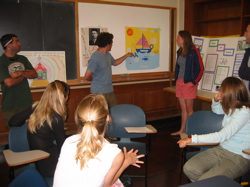

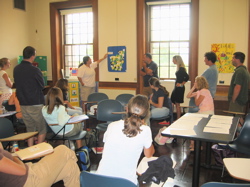
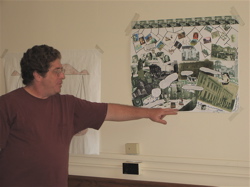
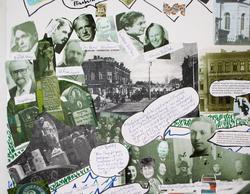
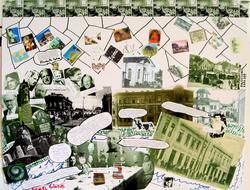
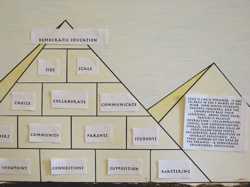
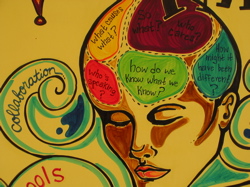
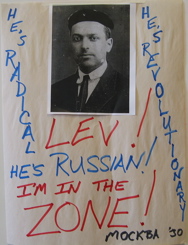
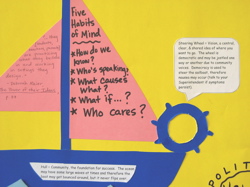
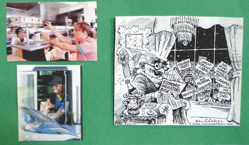
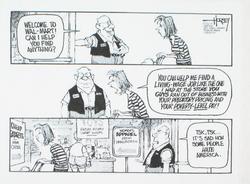
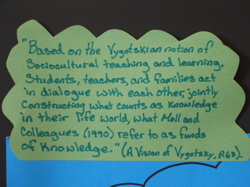
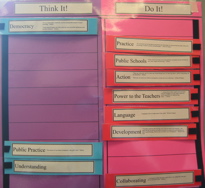
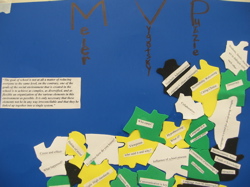
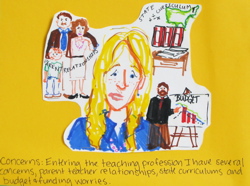
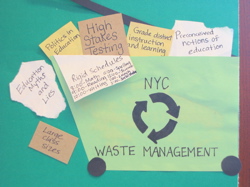

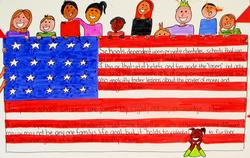
Comments for Monday’s Class (7/3/06)
Posted: July 3rd, 2006 by Charles Rathbone
This transition class is always a tough one. We switch from one book to another, we start a new focus on strategies – CL through the eyes of CI. And to top it off, we may have been the only class in session at UVM. (Actually, there were a few more.) I wanted to show the secondary example because we often use just elementary examples. The structures work across all grade levels. But without a focus on your own classroom, the “how does this work for me?” question becomes kind of a nagging itch. Anyway, we’ll continue to refine what all this looks like on Wednesday. Same strategies, different kids. Thanks for your energy today!
The simple fact that kids learn more when they can talk and work together on what it is you want them to know causes teachers to have to shift so many strategic moves in order to enale this to happen in an authentic and personalized way. But that’s the vision. What do you think?
comments | 29 Comments »